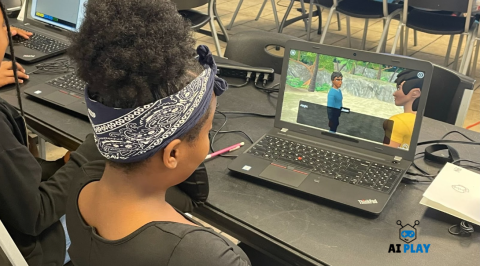Body
Image

Engaging Rural Students in Artificial Intelligence to Develop Pathways for Innovative Computing Careers
Advances in AI are fundamentally reshaping the workplace of the future and accelerating the demand for creating and sustaining an AI-literate workforce. This demand highlights the importance for all K-12 students to develop an understanding of AI to prepare them for future careers. The AI Play project introduces AI concepts to middle grades students (ages 11-14) and teachers through workshops, camps, and school-based programs in rural communities of North Carolina. With a focus on fostering students' creative expression, the learning environment will infuse AI learning into interactive digital game design activities that enable students to create personally meaningful game scenarios. To address the need to broaden participation in the STEM workforce, youth from historically underrepresented groups in STEM fields have been recruited to participate in week-long AI Play Exploration Camp where they engage in AI learning experiences. Students also participate in interactive presentations and demonstrations led by industry professionals from the Research Triangle Park exploring how AI is enhancing the workplace. The AI Play project offers professional development sessions that support teachers as they introduce AI to their students. The project is investigating which AI concepts in the context of digital games are most appropriate and engaging to students, and what are the support and scaffolding that teachers require in integrating AI education into their instructional designs.
Pillar 1: Innovative Use of Technologies in Learning and Teaching
The AI Play project integrates the 5 Big Ideas in AI —perception, representation & reasoning, learning, natural interaction, and societal impact—into dynamic, game-based learning activities, tailored to rural middle grades students. These activities center on applications for pathfinding, facial recognition, conversational NPCs, and autonomous gameplay agents. This approach allows students to explore AI through digital game design and playful experiences, enhancing their learning in an engaging and interactive manner.
Pillar 2: Partnerships for Career and Workforce Preparation.
A highlight of the AI Play summer camps are the interactive presentations and demonstrations by professionals from the Research Triangle Park. Complementing their presentations are engaging group discussions, interactive demonstrations, and hands-on activities highlighting AI uses throughout STEM fields. To understand if AI Play develops targeted outcomes for students, we are investigating students’ attitudes toward AI and students’ interest in AI careers.
Pillar 3: Strategies for Equity in STEM Education
Our work intentionally recruits from and works closely with students and teachers from underserved communities, specifically from rural areas of North Carolina that often have lower socioeconomic levels, educational attainment, and access to technology-rich learning opportunities. We continuously refine our educational materials and software based on feedback from students and teachers in rural communities to ensure our learning and teaching technologies are both age-appropriate and relevant to rural settings.

Discipline(s)
Computer and informational technology science
Emerging Tech (Artificial Intelligence, Quantum Computing, and Blockchain)
Target Gradespan(s)
Middle school (6-8)
Target Participant(s)
Youth / students
Educators
Project Setting(s)
Formal Education
Informal Education
Category
Developing and Testing Innovations (DTI)